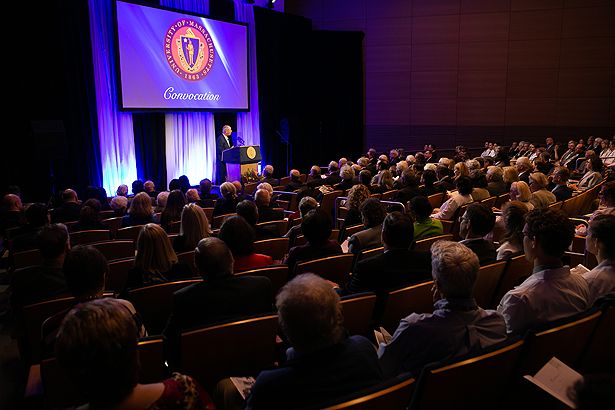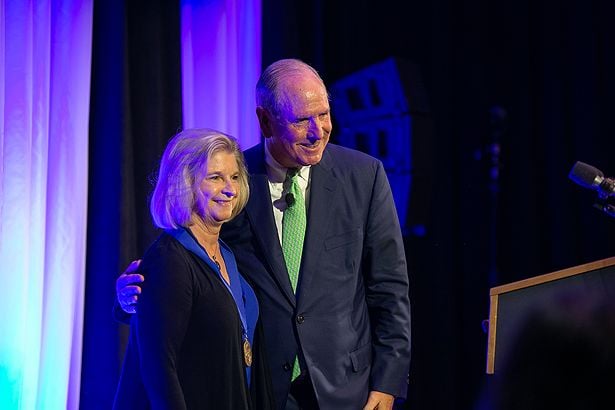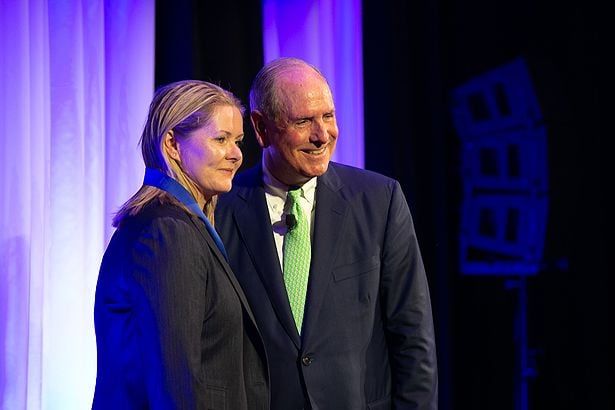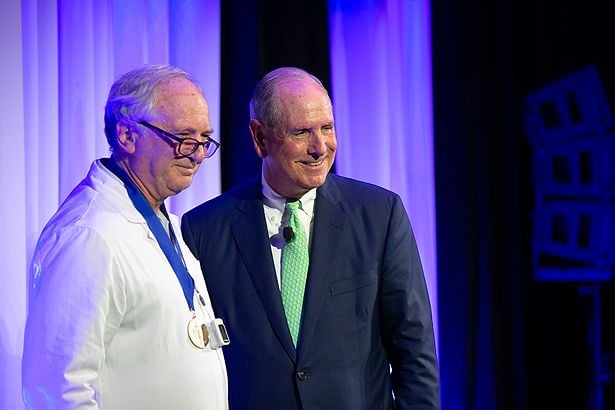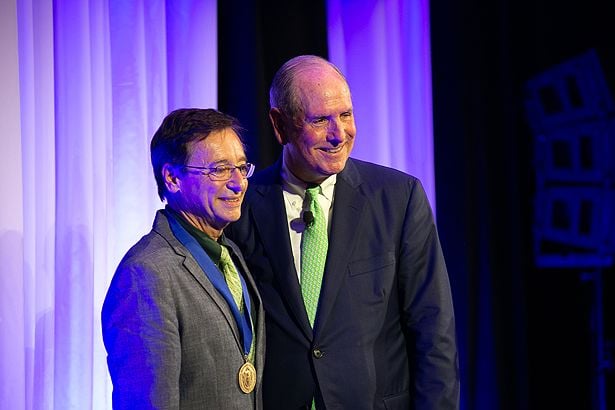In his annual Convocation address marking the start of the academic year at UMass Medical School, Chancellor Michael F. Collins celebrated campus accomplishments and announced the launch of a new strategic planning campaign. Chancellor Collins ticked off a list of achievements from the nursing, medical and graduate programs; research enterprise; and Commonwealth Medicine. He noted the development of two key monoclonal antibodies at MassBiologics, nearly $300 million in research support across the institution, and the commercial launch of two pivotal drugs based on discoveries made in the labs at UMMS.
“What is perhaps most striking about our university is that we are being recognized for our culture of collaboration, a cooperative energy that infuses our work, as disparate as our interests may appear,” Collins said, speaking from the podium of the Albert Sherman Center auditorium on Thursday, Sept. 13. “Great minds are creating great science. Great people are creating great culture. And great results are creating higher expectations, which we welcome.”
Collins said he will be examining the overall efficiencies and effectiveness of the operation at UMMS.
“We have embarked on another strategic planning exercise to examine why we do things and how we do them,” he said. “As a community, it is imperative to challenge ourselves to be at the leading edge of educational innovation, basic science and translational discovery, efficient and effective business practices, and community and global influence.”
The highlight of the chancellor’s accolades accompanied the awarding of Chancellor’s Medals to four distinguished faculty for their exemplary teaching, scholarship, clinical excellence and service at UMass Medical School.
Janet Hale, PhD, professor of nursing and associate dean of interprofessional and community partnerships for the GSN, received the Chancellor’s Medal for Distinguished Teaching. As recipient of the recognition, Dr. Hale will receive the Manning Prize for Excellence in Teaching, a $10,000 gift made possible through the generosity of Donna and Robert J. Manning, chairman of the UMass Board of Trustees.
“Dr. Hale, you have been described as ‘our campus’s preeminent educational champion and leading teacher for inter-professional education.’ In fact, your span of influence, now nearly two decades in the making, crosses the boundaries of our schools and extends from students, to trainees, to fellow faculty colleagues,” Collins said, presenting the medal to Hale. “You are comfortable as a preceptor for one, a small group leader for many, an innovator among groundbreakers and a developer for all.”
Katherine Fitzgerald, PhD, the Worcester Foundation Chair in Biomedical Sciences, professor of medicine and director of the UMMS Program in Innate Immunity, received the Chancellor’s Medal for Distinguished Scholarship.
“Dr. Fitzgerald, you have been described as ‘the leading innate immunologist of [your] generation . . . who has made numerous critically important discoveries in the field of innate detection of pathogens that have revolutionized our understanding of the complex processes of immunity,’” Collins said. “Yours is a local, national and international reputation. Together with your UMass colleagues, you have been present to the innate immunity community both here and throughout the world. You are a gifted investigator whose many influential discoveries have made you a leader who is ‘an imaginative and original thinker’ in the highly competitive field of innate immunity.”
Theo Meyer, MD, PhD, professor of medicine, received the Chancellor’s Medal for Distinguished Clinical Excellence.
“You came to our institution to care for those with heart failure; yet, it is the strength of your heart that has created a program and personal practice commitment that has served so many so well for so long,” Collins said. “You care about the quality of the health care your patients receive. You work to assure seamless transitions to that care. You know that your patients are in need of your commitment to their healing. You appreciate that kind words and gentle gestures matter. Yours is a ‘common touch’ that defines the high ideals of an expert clinician.”
Robert Baldor, MD,professor of family medicine & community health, received the Chancellor’s Medal for Distinguished Service.
“You have been described as one who ‘brings good humor, a strong work ethic and sense of responsibility, team integration and the ability to get things done with all projects assigned. You are intellectually honest and challenge dogma in the proper way, using evidence-based medicine,’” Collins said. “Yours is an outstanding example as mentor, teacher, clinician and committed member of our community.”
